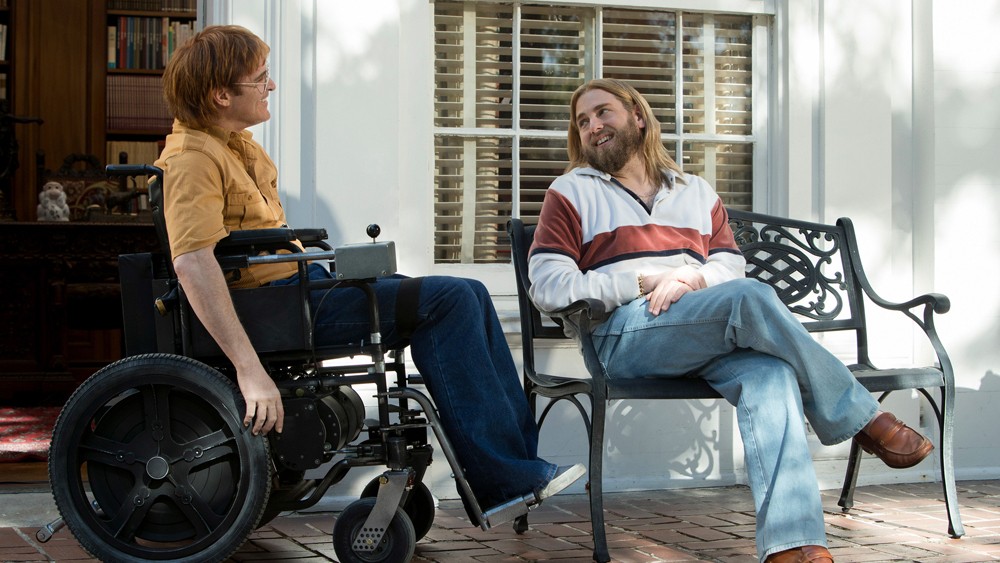Directed by Gus Van Sant (Good Will Hunting, Milk) and starring Joaquin Phoenix, Jonah Hill and Rooney Mara, Don't Worry, He Won't Get Far on Foot is an alternately raw and sentimental journey through the 12 Steps of Alcoholics Anonymous. Performances by Phoenix and Hill rescue the film from its frequent gooey-ness, but Van Sant's chronological tampering and formal experimentation don't do a whole lot to enliven a plodding script. Still, this heartfelt drama, which opens Friday at the Cedar Lee, has several searing scenes that compensate for a good deal of muddiness in the middle.
It's more or less a standard biopic of John Callahan, the Portland cartoonist who died in 2010, which takes as its central focus Callahan's recovery from a savage car crash that left him a quadriplegic, and his alcoholism. Callahan's cartooning is a means of therapy on his path to sobriety — he draws by gripping a marker with both hands, producing his distinctive primitive style — but the movie is much more about AA than about art.
The day of the crash is conveyed via flashback early on, as an older Callahan repeats the story to both his AA group and to a hall full of people there to appreciate him — he's either accepting an award or giving a public talk — and it's a successful narrative device. The sequence is gripping because we know tragedy awaits, and we watch as Callahan and a new boozy friend, Dexter (Jack Black), get unthinkably loaded on a bar-hopping bender.
After a heart-rending introductory appointment with a hospital therapist (Rooney Mara), the film loses steam during its girthy middle. Apart from the fact that the chronology is often wildly unclear — there are moments when Callahan begins drinking and we don't know if it's before he gave up alcohol or after (in which case, taking the drink would be a more pivotal moment) — the action itself is repetitive. As I say, it's a pretty exhaustive tour through the stages of AA, and few are left unexplored: Callahan admitting that he is powerless; Callahan believing that a personal higher power can restore him to sanity; Callahan turning his life over to his personal higher power (fleetingly, the genitals of Raquel Welch — the film takes place in the '70s); Callahan making a list of all those he has wronged; Callahan making amends face to face ... and so on.
Much of the AA small-group material, led by the gay trust-fund kid Donnie Green (Jonah Hill), is heartfelt stuff. But these scenes are often tangents. And at times, the film seems as if it has been concocted solely as an AA commercial.
The element that I, as a viewer, may have appreciated most was pretty meta: the degree to which both Phoenix and Hill play versions of themselves — people who struggle mightily with addiction and who have lost those close to them from the same. Jonah Hill's brother, music producer Jordan Feldstein, was found dead earlier this year in a room scattered with canisters of nitrous oxide. Joaquin Phoenix made the famous 911 call to summon police to his OD-ing brother, River Phoenix, in 1993. Both have struggled with alcoholism personally.
Their performances are understated. I was worried about Hill's at the start — he has never looked more like the mid-aughts rom-com heart throb, Josh Lucas — but he quickly became my favorite character, in large part because the sincerity of his commitment to his sponsorees, whom he calls his "piglets," was so unexpected.


